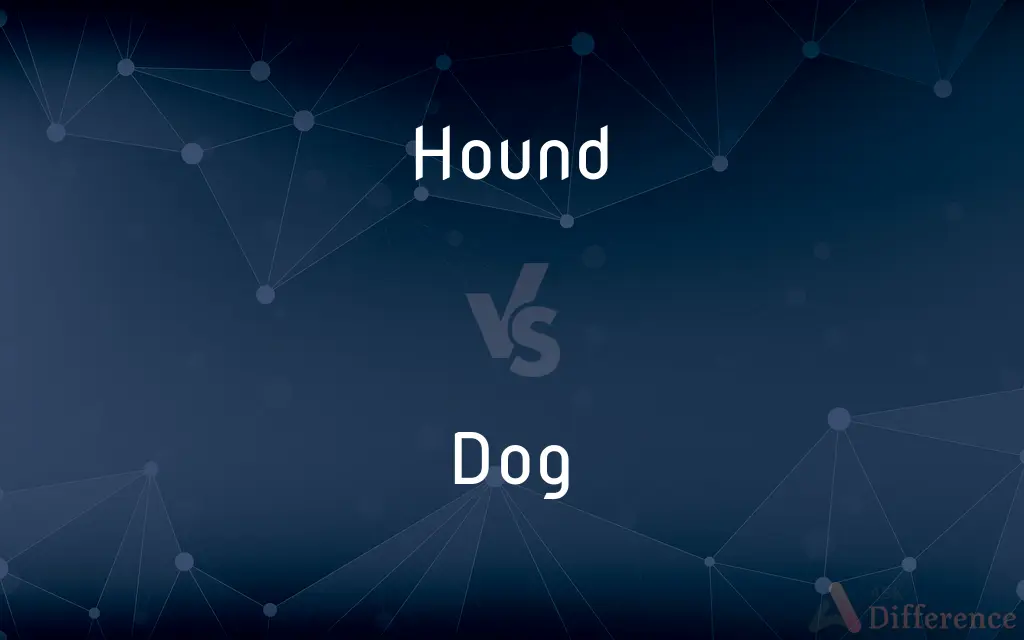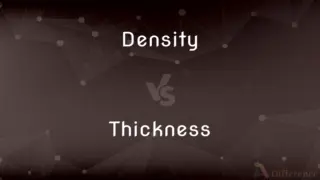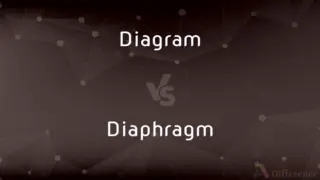Hound vs. Dog — What's the Difference?
Edited by Tayyaba Rehman — By Maham Liaqat — Updated on March 11, 2024
Hounds are a specific group of dog breeds known for their hunting abilities, particularly using scent or sight. "Dog" is any member of the domesticated species Canis lupus familiaris, encompassing a wide range of breeds with diverse traits and purposes.

Difference Between Hound and Dog
Table of Contents
ADVERTISEMENT
Key Differences
Hounds represent a specific category within the broader classification of dogs, distinguished by their specialized hunting skills. These breeds, such as beagles, greyhounds, and bloodhounds, are adept at tracking or chasing game, either by scent or sight. On the other hand, the term "dog" encompasses the entire domesticated species Canis lupus familiaris, which includes all breeds, from working and herding dogs to companion and toy breeds, each with unique characteristics beyond hunting.
The hound group is further divided into scent hounds and sight hounds, highlighting their primary hunting methods. Scent hounds, like the bloodhound, rely on their keen sense of smell to track, while sight hounds, such as the greyhound, use their acute vision and speed. In contrast, dogs as a whole display a vast array of skills and traits, developed for various roles such as herding, guarding, companionship, and service, reflecting their adaptation to a wide range of human needs and environments.
Hounds are often valued for their endurance, determination, and specialized abilities in hunting contexts. These traits make them excellent companions for hunting and tracking activities. Conversely, dogs, in general, have been bred for a multitude of purposes, leading to a significant diversity in size, temperament, and aptitude, from the diminutive Chihuahua to the imposing Great Dane, and from the gentle Labrador Retriever to the protective German Shepherd.
The training and socialization needs of hounds can differ from other dog groups due to their strong hunting instincts and independence. For example, scent hounds may be more prone to following a scent trail, requiring careful management in outdoor settings. Dogs from other groups might have different focuses in training, such as obedience, agility, or service tasks, depending on their breed characteristics and roles.
While hounds are often associated with outdoor and active lifestyles due to their hunting heritage, the broader dog category includes breeds suited to a variety of lifestyles and environments, from active outdoor enthusiasts to those seeking a more sedentary indoor companion. This diversity allows dogs to integrate into a wide range of human societies and fulfill various emotional, physical, and working roles.
ADVERTISEMENT
Comparison Chart
Definition
A specific group of dog breeds with hunting abilities, using scent or sight.
Any member of the domesticated species Canis lupus familiaris.
Primary Function
Hunting, tracking, or chasing game.
Diverse, including companionship, service, work, and protection.
Subcategories
Divided into scent and sight hounds.
Includes various groups like working, herding, toy, and sporting dogs.
Traits
Known for endurance, determination, and specialized hunting skills.
Wide range of sizes, temperaments, and skills, developed for various purposes.
Training & Socialization
May require specific training to manage hunting instincts and independence.
Training needs vary widely depending on breed purpose and characteristics.
Compare with Definitions
Hound
Known for their endurance and determination in tracking.
Bloodhounds have been used for centuries in search and rescue operations.
Dog
Encompasses a wide range of breeds with diverse traits.
From the tiny Chihuahua to the majestic Great Dane, dogs come in all sizes.
Hound
Includes breeds like greyhounds and whippets.
Greyhounds are renowned for their speed and agility in coursing games.
Dog
Refers to any member of the domesticated species Canis lupus familiaris.
Dogs have been human companions for thousands of years.
Hound
Often used in sporting and hunting activities.
Coonhounds are popular in North American game hunting.
Dog
Serves various roles from companionship to work.
German Shepherds are often used in police and service roles.
Hound
Dog breeds specialized in hunting, using scent or sight.
The beagle, a scent hound, is excellent at tracking rabbits.
Dog
Training and socialization needs vary by breed.
Border Collies excel in agility training due to their high energy and intelligence.
Hound
A hound is a type of hunting dog used by hunters to track or chase prey.
Dog
Breeds are adapted to different human needs and environments.
Siberian Huskies thrive in cold climates, while Bulldogs are suited for less active lifestyles.
Hound
A domestic dog of any of various breeds commonly used for hunting, characteristically having drooping ears, a short coat, and a deep resonant voice.
Dog
The domestic dog (Canis familiaris or Canis lupus familiaris) is a domesticated descendant of the wolf. The dog derived from an ancient, extinct wolf, and the modern grey wolf is the dog's nearest living relative.
Hound
A dog.
Dog
A domesticated carnivorous mammal (Canis familiaris syn. Canis lupus subsp. familiaris) occurring as a wide variety of breeds, many of which are traditionally used for hunting, herding, drawing sleds, and other tasks, and are kept as pets.
Hound
A contemptible person; a scoundrel.
Dog
Any of various carnivorous mammals of the family Canidae, such as the dingo.
Hound
One who eagerly pursues something
A gossip hound.
Dog
A male animal of the family Canidae, especially of a fox or a domesticated breed.
Hound
A devotee or an enthusiast
A coffee hound.
Dog
Any of various other animals, such as the prairie dog.
Hound
To pursue relentlessly and tenaciously
The suspect was hounded by the police for weeks.
Dog
A person
You won, you lucky dog.
Hound
To make repeated demands of or subject to persistent criticism
Her parents hounded her until she agreed to look for a better job.
Dog
A person regarded as contemptible
You stole my watch, you dog.
Hound
To pressure or force from a place or situation
Accusations that hounded him out of office.
Dog
A person regarded as unattractive or uninteresting.
Hound
A dog, particularly a breed with a good sense of smell developed for hunting other animals.
Dog
Something of inferior or low quality
"The President had read the speech to some of his friends and they told him it was a dog" (John P. Roche).
Hound
Any canine animal.
Dog
An investment that produces a low return or a loss.
Hound
(by extension) Someone who seeks something.
Dog
Dogs(Slang) The feet.
Hound
(by extension) A male who constantly seeks the company of desirable women.
Dog
See andiron.
Hound
A despicable person.
Dog
(Slang) A hot dog; a wiener.
Hound
A houndfish.
Dog
Any of various hooked or U-shaped metallic devices used for gripping or holding heavy objects.
Hound
Projections at the masthead or foremast, serving as a support for the trestletrees and top to rest on; foretop
Dog
(Astronomy) A sundog.
Hound
A side bar used to strengthen portions of the running gear of a vehicle.
Dog
Totally; completely. Often used in combination
Dog-tired.
Hound
(transitive) To persistently harass.
He hounded me for weeks, but I was simply unable to pay back his loan.
Dog
To track or trail persistently
"A stranger then is still dogging us" (Arthur Conan Doyle).
Hound
(transitive) To urge on against; to set (dogs) upon in hunting.
Dog
To hold or fasten with a mechanical device
"Watertight doors and hatches were dropped into place and dogged down to give the ship full watertight integrity" (Tom Clancy).
Hound
A despicable person.
Dog
To be persistently or inescapably associated with
Questions about his youthful indiscretions dogged him throughout his career.
Hound
A houndfish.
Dog
To be recurrently or persistently in the mind; haunt
Despair dogged him in his final years.
Hound
Projections at the masthead, serving as a support for the trestletrees and top to rest on.
Dog
A mammal of the family Canidae:
Hound
A side bar used to strengthen portions of the running gear of a vehicle.
Dog
The species Canis familiaris (sometimes designated Canis lupus familiaris), domesticated for thousands of years and of highly variable appearance because of human breeding.
The dog barked all night long.
Hound
To set on the chase; to incite to pursuit; as, to hounda dog at a hare; to hound on pursuers.
Dog
Any member of the family Canidae, including domestic dogs, wolves, coyotes, jackals, foxes, and their relatives extant and extinct; canid.
Hound
To hunt or chase with hounds, or as with hounds.
Dog
A male dog, wolf, or fox, as opposed to a bitch or vixen.
Hound
Any of several breeds of dog used for hunting typically having large drooping ears
Dog
The meat of this animal, eaten as food:
Did you know that in South Korea, they eat dog?
Hound
Someone who is morally reprehensible;
You dirty dog
Dog
A person:
Hound
Pursue or chase relentlessly;
The hunters traced the deer into the woods
The detectives hounded the suspect until they found the him
Dog
A dull, unattractive girl or woman.
She’s a real dog.
Hound
Can be divided into scent and sight categories.
The basset hound, with its keen sense of smell, is a classic scent hound.
Dog
(slang) A man, guy, chap.
You lucky dog!
Dog
(derogatory) Someone who is cowardly, worthless, or morally reprehensible.
Come back and fight, you dogs!
You dirty dog.
Dog
A mechanical device or support:
Dog
Any of various mechanical devices for holding, gripping, or fastening something, particularly with a tooth-like projection.
Dog
A click or pallet adapted to engage the teeth of a ratchet wheel, to restrain the back action.
Dog
A metal support for logs in a fireplace.
The dogs were too hot to touch.
Dog
(cartomancy) The eighteenth Lenormand card.
Dog
A hot dog: a frankfurter, wiener, or similar sausage; or a sandwich made from this.
Dog
Underdog.
Dog
Foot.
Dog
(Cockney rhyming slang) (from "dog and bone") Phone or mobile phone.
Dog
One of the cones used to divide up a racetrack when training horses.
Dog
(informal) Something that performs poorly.
That modification turned his Dodge hemi into a dog.
Dog
(film) A flop; a film that performs poorly at the box office.
Dog
(transitive) To pursue with the intent to catch.
Dog
(transitive) To follow in an annoying or harassing way.
The woman cursed him so that trouble would dog his every step.
Dog
To fasten a hatch securely.
It is very important to dog down these hatches.
Dog
To intentionally restrict one's productivity as employee; to work at the slowest rate that goes unpunished.
A surprise inspection of the night shift found that some workers were dogging it.
Dog
(transitive) To criticize.
Dog
To divide (a watch) with a comrade.
Dog
(slang) Of inferior quality; dogshit.
Dog
A quadruped of the genus Canis, esp. the domestic dog (Canis familiaris).
Dog
A mean, worthless fellow; a wretch.
What is thy servant, which is but a dog, that he should do this great thing?
Dog
A fellow; - used humorously or contemptuously; as, a sly dog; a lazy dog.
Dog
One of the two constellations, Canis Major and Canis Minor, or the Greater Dog and the Lesser Dog. Canis Major contains the Dog Star (Sirius).
Dog
An iron for holding wood in a fireplace; a firedog; an andiron.
Dog
A grappling iron, with a claw or claws, for fastening into wood or other heavy articles, for the purpose of raising or moving them.
Dog
An ugly or crude person, especially an ugly woman.
Dog
A hot dog.
Dog
To hunt or track like a hound; to follow insidiously or indefatigably; to chase with a dog or dogs; to worry, as if by dogs; to hound with importunity.
I have been pursued, dogged, and waylaid.
Your sins will dog you, pursue you.
Eager ill-bred petitioners, who do not so properly supplicate as hunt the person whom they address to, dogging him from place to place, till they even extort an answer to their rude requests.
Dog
A member of the genus Canis (probably descended from the common wolf) that has been domesticated by man since prehistoric times; occurs in many breeds;
The dog barked all night
Dog
A dull unattractive unpleasant girl or woman;
She got a reputation as a frump
She's a real dog
Dog
Informal term for a man;
You lucky dog
Dog
Someone who is morally reprehensible;
You dirty dog
Dog
A smooth-textured sausage of minced beef or pork usually smoked; often served on a bread roll
Dog
A hinged catch that fits into a notch of a ratchet to move a wheel forward or prevent it from moving backward
Dog
Metal supports for logs in a fireplace;
The andirons were too hot to touch
Dog
Go after with the intent to catch;
The policeman chased the mugger down the alley
The dog chased the rabbit
Common Curiosities
Do all dogs have the same training needs?
No, training needs can vary widely among dogs, depending on their breed characteristics, intended roles, and individual personalities.
Can all dogs hunt like hounds?
While many dogs have hunting instincts, hounds are specifically bred for their exceptional tracking or chasing abilities.
Are hounds good family pets?
Many hounds can make good family pets, especially when their exercise and mental stimulation needs are met, but their strong hunting instincts may require careful management.
Can hounds be used for roles other than hunting?
Yes, while hounds are bred for hunting, many have been successfully used in roles such as search and rescue, therapy, and as family pets.
Are some dog breeds easier to train than others?
Yes, certain breeds are known for their trainability and intelligence, such as Border Collies and Poodles, while others may present more challenges due to independent or stubborn traits.
How do I train a dog with strong hunting instincts?
Training a dog with strong hunting instincts involves consistent, positive reinforcement training, channeling their instincts into controlled activities, and ensuring they're mentally and physically stimulated.
What makes a dog a hound?
A dog is classified as a hound based on its breeding and traits, particularly its specialized hunting skills, either by using scent or sight.
What is the main difference between scent and sight hounds?
Scent hounds primarily use their keen sense of smell to track game, while sight hounds rely on their acute vision and speed.
How do I know if a hound breed is right for me?
Choosing a hound breed involves considering factors like lifestyle, exercise ability, and readiness to manage their hunting instincts and need for mental engagement.
Are smaller dog breeds less active than larger ones?
Not necessarily; activity levels are more breed-specific than size-specific. Some small breeds, like Jack Russell Terriers, are highly energetic, while some larger breeds may be more laid-back.
Why are there so many different dog breeds?
Different dog breeds have been developed over centuries to perform specific roles that humans needed, such as herding, hunting, guarding, and companionship, leading to the vast diversity seen today.
Do hounds require more exercise than other dogs?
Hounds, especially those bred for endurance and speed, typically require substantial exercise to maintain their physical and mental health.
What is the most popular dog breed?
Popularity of dog breeds can vary by region and over time. Breeds like the Labrador Retriever have consistently ranked high in many areas for their versatility and temperament.
Can any dog be trained for hunting?
While many dogs can be trained to some degree in hunting-related tasks, hounds have innate abilities and instincts that make them particularly suited for these activities.
What should I consider when choosing a dog breed?
Consider factors like size, energy level, grooming needs, temperament, and compatibility with your lifestyle and living environment when choosing a dog breed.
Share Your Discovery

Previous Comparison
Density vs. Thickness
Next Comparison
Diagram vs. DiaphragmAuthor Spotlight
Written by
Maham LiaqatEdited by
Tayyaba RehmanTayyaba Rehman is a distinguished writer, currently serving as a primary contributor to askdifference.com. As a researcher in semantics and etymology, Tayyaba's passion for the complexity of languages and their distinctions has found a perfect home on the platform. Tayyaba delves into the intricacies of language, distinguishing between commonly confused words and phrases, thereby providing clarity for readers worldwide.














































